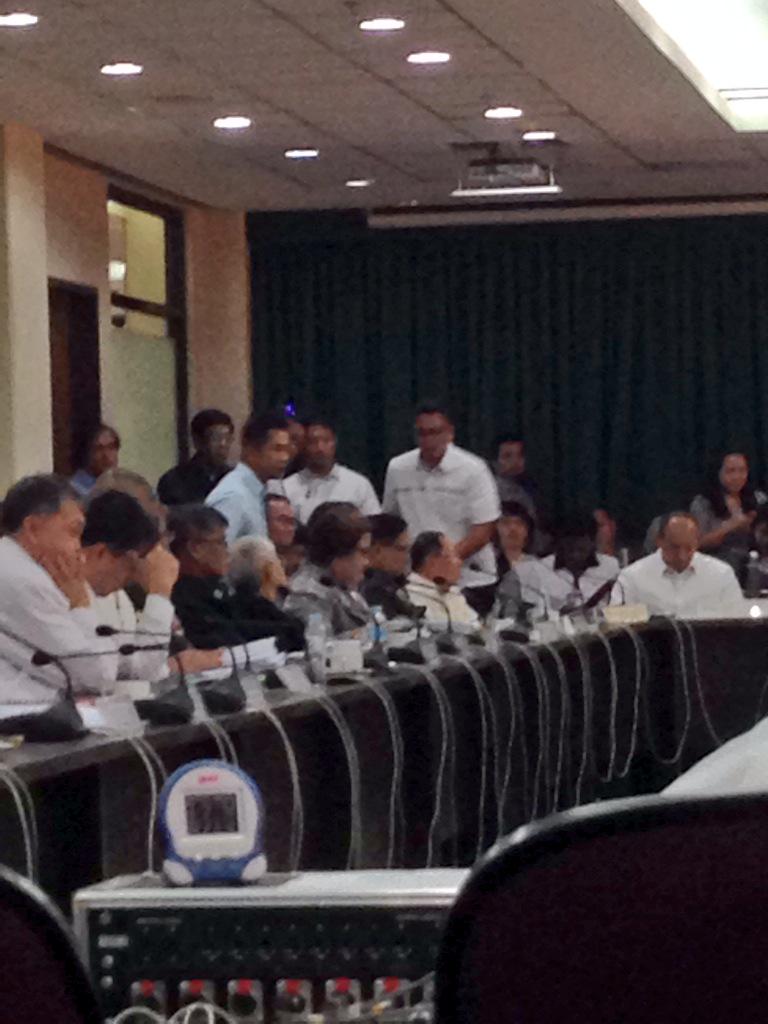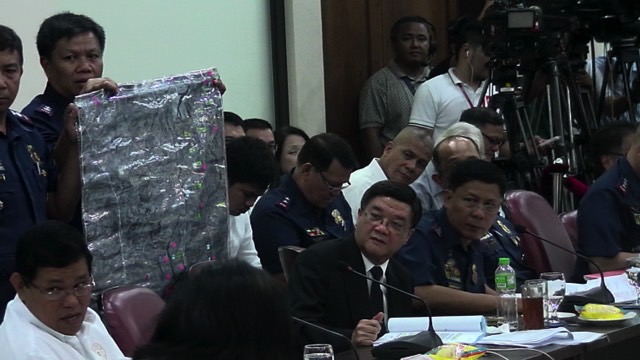Google Maps? Try
maps sourced from American security forces.
Sacked Philippine
National Police (PNP) Special Action Force (SAF) chief Police Director Getulio
Napeñas on Tuesday, April 7, denied claims by the military that his officers
used Google Maps to plot the locations of beleaguered policemen during a
botched high-risk operation on January 25.
Responding to
questions from legislators during the House of Representative’s second hearing
on the controversial police operation, Colonel Gener del Rosario, commander of
the Army’s 1st Mechanized Brigade, said SAF officers brought with
them a “Google Map” when they were asking for help from military forces.
Del Rosario was
referring to former SAF deputy director Chief Superintendent Noli Talinõ and
Superintendent Michael John Mangahis.
The map was
different from the tactical map the military typically uses.
But Napeñas
debunked Del Rosario’s claim, brandishing a map which he said was not sourced
from Google. Asked by Gabriela Representative Luz Ilagan where the map came
from, Napeñas coyly said: “US
counterparts.”
Del Rosario,
however, said it was not the same map he saw on January 25.
Pressed on which
agency or unit the United
States counterparts had come from, Napeñas
said he would be willing to answer the question during an executive session.
Napeñas did say,
however, that they requested for the map.
US involvement
The exchange
between legislators, Napeñas, Taliño, Mangahis,
Del Rosario, and 6th Infantry
Division chief Major General Edmundo Pangilinan tackled at least two sore
points in the high-risk and now highly-controversial police operation: the lack
of artillery support and the involvement of American nationals.
Pangilinan
confirmed before the House of Representatives an earlier statement he made
before the Senate during an executive session: a foreign national had ordered
him to fire artillery. The military general, however, said he could not
determine the nationality of the “Caucasian-looking person in civilian attire.”
According to the
Senate committee’s draft report on the bloody operation, which claimed the
lives of at least 67 people, an “American” ordered Pangilinan to fire artillery to save the beleaguered
members of the SAF’s 55th and 84th Special Action Companies.
But Pangilinan
did not budge.
The PNP’s Board
of Inquiry (BOI) report on the clash noted 6 American nationals were at the SAF’s tactical command post
during the operation, giving “real-time” information to the troopers on the
ground.
The same
Americans helped in the medical evacuation of the clash’s survivors.
How can we
help?
Artillery support
– or the lack of it – is a sore issue in police and military circles after the
Mamasapano incident. Police officials have insisted that had the military
launched artillery earlier, less lives would have been lost.
But the military
insists information was dearth in the morning, preventing them from giving
artillery support.
Del Rosario said
Managhis called him at around 6:45 am on January 25 to ask for support for the
beleaguered SAF troopers. Since Del Rosario was unaware of the details of the
operation, he asked Mangahis to report to his headquarters for better
coordination.
“When [Taliño and
Managhis] arrived, I asked them how their troops were. They laid down a
zoomed-in Google Map on the table and gave me a quick briefing. They pinpointed
where their advance command post was, the first group, the second group, the
third group, the main effort, but they did not tell me which units were
involved,” Del Rosario said in a mix of English and Filipino.
Del Rosario added
that neither Taliño nor Mangahis could give him complete details when they went
to the 1st Mechanized Brigade’s headquarters. “I asked Taliño and Mangahis: So,
sir, what’s your plan so we can help reinforce your troops?” Del Rosario asked
the two police officers.
The military
colonel said he was met with silence. Del Rosario said that since he “sensed”
the SAF troopers were still “developing” their reinforcement plan, they took it
upon themselves to analyze the situation.
Del Rosario said
he then explained the situation on the ground and the nuances of Mamasapano
town, a known bailiwick of the Moro Islamic Liberation Front (MILF), its
breakaway group the Bangsamoro Islamic Freedom Fighters (BIFF), and private
armed groups.
The options, Del
Rosario said, was to either send in troops or armored vehicles.
But Taliño, Del Rosario recalled, wanted
artillery support since the 55th Special Action Company by then were already
pinned down by Muslim rebels. Del Rosario said it was a risky operation since
they could not determine the exact location of their troopers – civilians have
been in the area.
Del Rosario added
that the authority to launch artillery was not his.
But the military
colonel said the third option – launching artillery – was only introduced
because “[Taliño is] a general asking me for an artillery.”
Controversial
operation
In the wee hours
of the morning on January 25, some 400 SAF troopers were involved in an
operation to neutralize Malaysian terrorist Zulkifli bin Hir, alias “Marwan”
and Filipino bomb maker Abdul Basit Usman.
The SAF got
Marwan but Usman fled in an operation that saw police commandos in clashes
against the MILF, BIFF, and PAGs.
The bloodiest
one-day operation in PNP history claimed at least 67 lives, including 5
civilians, 18 MILF fighters, and 44 of the SAF’s own. (Editor’s note: The
MILF says 17 of its fighters died)
It is also the
biggest crisis to hit President Benigno Aquino III’s administration. Aquino has
been criticized for his supposed lack of empathy for those slain in Mamasapano
and for his involvement in the operation.
The BOI said
Aquino had broken the PNP’s chain of command in dealing with Napeñas directly
instead of going through PNP officer-in-charge Police Deputy Director General
Leonardo Espina.
Aquino, the BOI
report said, also allowed the participation of his friend, now-resigned PNP
chief Director General Alan Purisima, who at that time was serving a preventive
suspension order.



